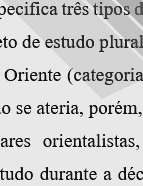

................................
1383 brought the alleged historical emergence of social groups and classes who, from the bourgeoisie to the rudiments of the urban and rural proletariat, passed the torch of progress from hand to hand, thus embodying modernity, the tomorrow to come. In turn, the Marxist vision identified key aristocratic, military and religious actors in the national past whose reactionary matrix was seen as inspiration for the Estado Novo itself, which took them as bulwarks of counter-modernity. However, the social criterion of division equally liaised with a national criterion, to such an extent that, in the light of Marxism, modernity emerged as a desideratum dependent on the country's national assertion, while counter-modernity, driven by the interests of the ruling classes, was expressed through the loss of national autonomy and independence at the hands of foreign powers, from the kingdom of Castile to the North American multinationals, including British domination.
It was also by combining criteria of a social nature with those of a national character that Marxist historians analysed Portuguese expansionism and colonialism. On the one hand, they advocated that the raison d'être of the pioneering spirit of Portuguese expansion had stemmed from the social and cultural consequences of the revolution of 1383. Furthermore, they identified in this revolution the foundation of what was considered, by historiographical currents of distinct political and ideological tones, to be the golden period of Portugal's history. On the other hand, they attributed the raison d'être of the elements of colonial oppression so characteristic of expansionism to the negative effects of a counter-modern Portugal which, in their view, was more reactionary the more subjugated it was to the interests of modern Western colonial powers. Thus, Marxist historiography served to convey an interpretation of the past which was compatible with the theorisations of imperialism that became dominant within the communist movement, and conciliatorily embraced patriotism and anti-imperialism.
Production Mode and Class Struggle
However, the tension between modernity and counter-modernity, essential to Marxist visions of the national past, was operationalised differently in each study.
